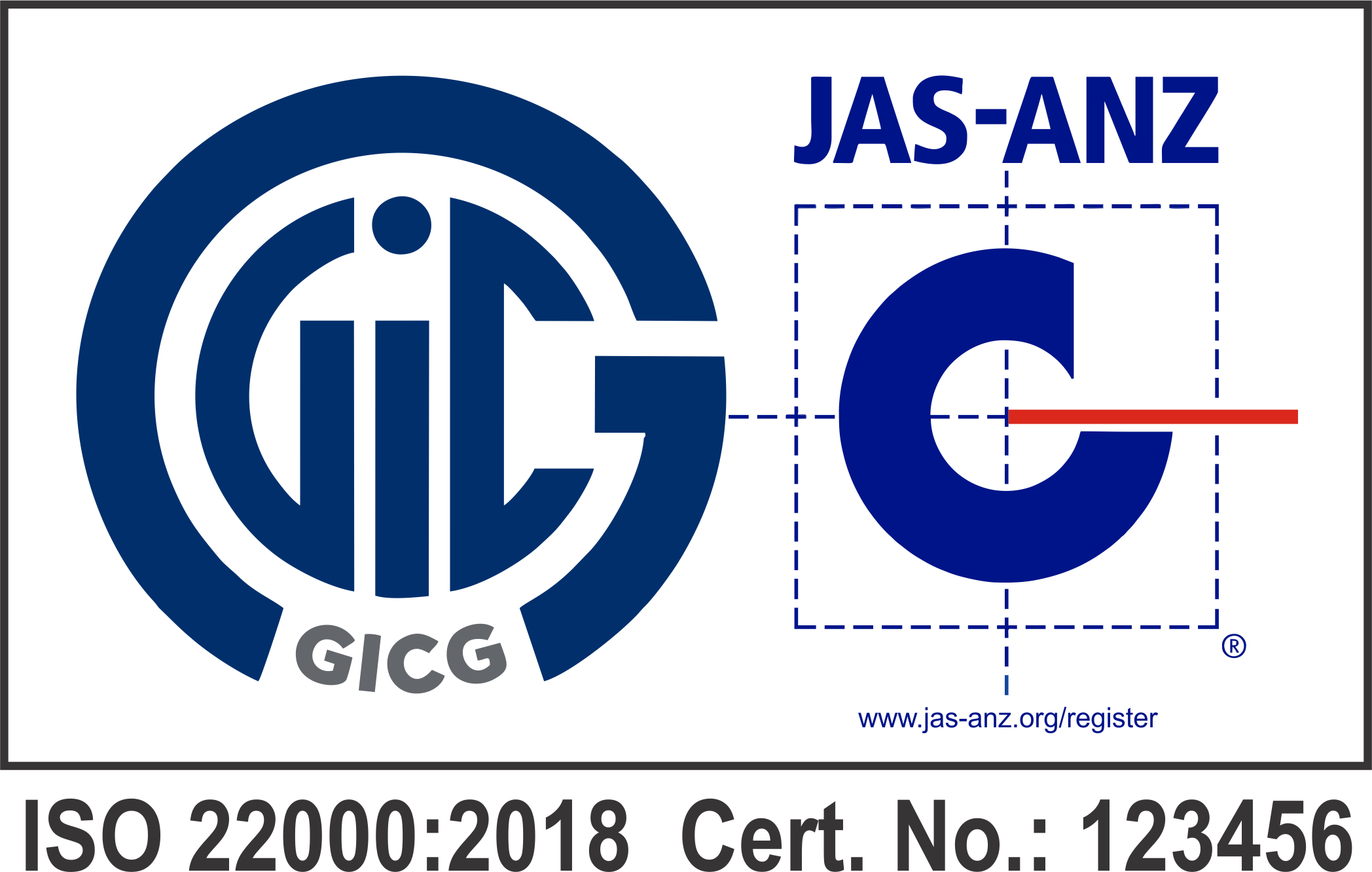Certification of Food Safety Management System ISO 22000:2018
 ISO 22000:2018 is an international standard for Food Safety Management Systems (FSMS), designed to ensure that food products meet safety requirements throughout the supply chain, from farm to table. This standard, issued by the International Organization for Standardization (ISO), is applicable to all businesses in the food chain, including producers, suppliers, retailers, and other related organizations.
ISO 22000:2018 is an international standard for Food Safety Management Systems (FSMS), designed to ensure that food products meet safety requirements throughout the supply chain, from farm to table. This standard, issued by the International Organization for Standardization (ISO), is applicable to all businesses in the food chain, including producers, suppliers, retailers, and other related organizations.
Alongside ISO 22000, several other food safety standards exist, such as GMP, HACCP, GlobalGAP, BRCGS, SQF, IFS, and FSSC 22000. Key distinctions include:
- HACCP focuses on analyzing and controlling specific hazards, while ISO 22000 is broader, integrating comprehensive management and quality management elements.
- Standards like BRC, SQF, and IFS often have more specific requirements for inspection and evaluation, while ISO 22000 is more flexible and can be easily integrated with other management systems.
- GlobalGAP emphasizes good agricultural practices from the initial stages of the supply chain, while GMP focuses on production conditions and infrastructure in processing facilities.
Depending on actual needs, food production and processing businesses should select a suitable management system to effectively manage production and business activities, thus creating safe, high-quality products for consumers.
Main Requirements of ISO 22000:
- Food Safety Policy: Establish a clear food safety policy aligned with the company’s overall strategy.
- HACCP Plan (Hazard Analysis and Critical Control Points): Develop and maintain a HACCP plan to identify, monitor, and control hazards.
- Resource Management: Ensure a well-trained workforce with adequate resources and capabilities to meet the management system’s requirements.
- Control and Improvement Processes: Establish control processes to detect and correct issues while continuously improving the food safety management system's effectiveness.
A business certified with the ISO 22000 Food Safety Management System gains a strong competitive edge, especially advantageous when exporting to demanding markets. Implementing ISO 22000 also brings other benefits, including:
- Ensuring Food Safety: The system enables businesses to identify, control, and minimize potential food safety hazards, ensuring the final product consistently meets the highest safety standards.
- Regulatory Compliance: ISO 22000 helps businesses meet legal and international regulatory requirements for food safety, promoting transparency and accountability in production and business.
- Enhanced Customer Trust: Achieving ISO 22000 certification demonstrates a commitment to food safety, increasing customer trust and loyalty.
II. CERTIFICATION PROCESS
.png) 1. Certification registration: To obtain ISO 22000:2018 certification, organizations need to contact GIC Vietnam for registration guidance. Organizations then complete the application and submit it to GIC Vietnam with the required certification documents.
1. Certification registration: To obtain ISO 22000:2018 certification, organizations need to contact GIC Vietnam for registration guidance. Organizations then complete the application and submit it to GIC Vietnam with the required certification documents.
2. Audit program and auditor assignment: GIC Vietnam develops an assessment program, clearly defining the activities needed to confirm that the organization’s food safety management system (FSMS) meets certification requirements. Auditors are selected based on expertise relevant to the assessment field, with additional technical auditors added as necessary.
Stage 1: Review documentation, conditions, scope, and the organization's readiness for stage 2 assessment. Stage 2: Evaluate the implementation and effectiveness of the management system, including the following steps: Opening Meeting → Department/Unit Evaluation → Assessment Report Preparation → Closing Meeting.
4. Assessment report and corrective actions: The organization must implement corrective actions for errors and deficiencies found during the assessment, ensuring all requirements are fully met.
5. Review and certification issuance: The Certification Council reviews the assessment records to decide on certification approval or denial. ISO 22000:2018 certification is issued once the organization fully meets the requirements and is valid for three years, with periodic monitoring required to maintain validity.
III. GIC CERTIFICATION BENEFITS
- International recognition: GIC is a globally recognized certification body, endorsed by prestigious organizations such as CPSC (USA), UKAS (UK), JAS-ANZ (Australia - New Zealand), SAAS (SAI), VICAS (Vietnam), SAC (Singapore), CNAS (China), and others. GIC certification offers national and international credibility, recognized by the International Accreditation Forum (IAF) and Asia-Pacific Accreditation Cooperation (APAC), helping businesses expand markets and increase global reputation.
- High-quality certification service with competitive cost: GIC Vietnam provides certification services to strict European and North American standards, ensuring that the business’s products and services meet international requirements. Alongside excellent service quality, GIC offers competitive, reasonable costs, helping businesses optimize expenses while achieving international recognition, facilitating participation in major markets and sustainable development.
For ISO 22000:2018 certification inquiries, please contact:
GIC VIETNAM
12F, 14 Lang Ha Building, Ba Dinh District, Hanoi
Tel: 024.6275 2268, Fax: 024.6275 2269, Email: tuandm@gicvn.vn
Ho Chi Minh City Office: R502, 160 Nam Ky Khoi Nghia, Tel: 028.39307936




